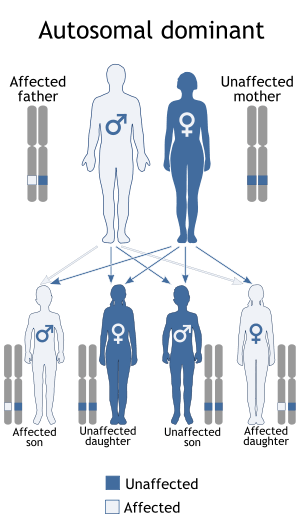Heart-hand diseases
| Heart-hand syndromes | |
|---|---|
| Synonym | Atriodigital dysplasia |
| Classification and external resources | |
| ICD-10 | Q87.2 |
| Orphanet | 228184 |
Heart-hand syndromes are a group of rare diseases that manifest with both heart and limb deformities.[1][2][3][4]
As of July 2013, known heart-hand syndromes include Holt–Oram syndrome, Berk–Tabatznik syndrome, heart-hand syndrome type 3, brachydactyly-long thumb syndrome, patent ductus arteriosus-bicuspid aortic valve syndrome and heart hand syndrome, Slovenian type.[5]
Types
Heart-hand syndrome type 1
| Heart-hand syndrome type 1 | |
|---|---|
| Synonym | Holt–Oram syndrome |
| Classification and external resources | |
| ICD-10 | Q87.2 |
| OMIM | 142900 |
| Orphanet | 392 |
Heart-hand syndrome type 1 is more commonly known as Holt–Oram syndrome. Is the most prevalent form of heart-hand syndrome.[1]
It is an autosomal dominant disorder that affects bones in the arms and hands (the upper limbs) and may also cause heart problems. The syndrome includes an absent radial bone in the arms, an atrial septal defect, and a first degree heart block.[6]
Heart-hand syndrome type 2
| Heart-hand syndrome type 2 | |
|---|---|
| Synonym | Tabatznik syndrome, Berk–Tabatznik syndrome |
| Classification and external resources | |
| ICD-10 | Q87.2 |
| Orphanet | 1350 |
Heart-hand syndrome type 2 is also known as Berk–Tabatznik syndrome. Berk–Tabatznik syndrome is a condition with an unknown cause that shows symptoms of short stature, congenital optic atrophy and brachytelephalangy. This condition is extremely rare with only two cases being found.[7]
Heart-hand syndrome type 3
| Heart-hand syndrome type 3 | |
|---|---|
| Synonym | Heart-hand syndrome, Spanish type |
| Classification and external resources | |
| ICD-10 | Q87.2 |
| OMIM | 140450 |
| Orphanet | 1342 |
Heart-hand syndrome type 3 is very rare and has been described only in three members of a Spanish family. It is also known as Heart-hand syndrome, Spanish type.[8][9]
Heart-hand syndrome, Slovenian type
| Heart-hand syndrome, Slovenian type | |
|---|---|
| Classification and external resources | |
| ICD-10 | Q87.2 |
| OMIM | 610140 |
| Orphanet | 168796 |
Several people in multiple generations have suffered this type. It causes sudden cardiac death due to ventricular tachycardia, and it prominently causes a unique type of brachydactyly with mild hand involvement and more severe foot involvement.[10]
Brachydactyly-long thumb syndrome
| Brachydactyly-long thumb | |
|---|---|
| Synonym | Brachydactyly, long thumb type |
| Classification and external resources | |
| ICD-10 | Q87.2 |
| OMIM | 112430 |
| Orphanet | 2946 |
Described in one family. A unique feature in the syndrome is symmetric brachydactyly with long thumbs.[11]
Patent ductus arteriosus-bicuspid aortic valve syndrome
| Patent ductus arteriosus-bicuspid aortic valve | |
|---|---|
| Synonym | Patent arterial duct-bicuspid aortic valve-hand anomalies syndrome |
| Classification and external resources | |
| ICD-10 | Q87.2 |
| OMIM | 604381 |
| Orphanet | 228190 |
It has been confirmed that Patent ductus arteriosus-bicuspid aortic valve syndrome is a distinct syndrome from an allelic variant of Char syndrome. Hand anomalies include metacarpal hypoplasia.[12]
Genetics

It is unknown if heart-hand syndromes are caused by shared or distinct genetic defects. It has been claimed that congenital heart diseases are caused by a limited number of shared genetic defects.[1]
Holt–Oram syndrome, Brachydactyly-long thumb syndrome, Patent ductus arteriosus-bicuspid aortic valve syndrome and Heart-hand syndrome, Slovenian type are known to be autosomally dominant disorders.
Brachydactyly-long thumb syndrome is known to have been transmitted from male-to-male in a single instance.[11]
See also
 Medicine portal
Medicine portal- Cardiovascular disease
- Congenital heart defect
- Congenital limb deformities
- Hand deformity
References
- 1 2 3 Basson, Craig T.; Solomon, Scott D.; Weissman, Barbara; MacRae, Calum A.; Poznanski, Andrew K.; Prieto, Felix; Fuente, Salvador Ruiz de la; Pease, William E.; Levin, S. E.; Holmes, Lewis B.; Seidman, J. G.; Seidman, Christine E. (1 March 1995). "Genetic Heterogeneity of Heart-Hand Syndromes". 91 (5): 1326–1329. doi:10.1161/01.CIR.91.5.1326. PMID 7867169. Retrieved 25 July 2016 – via circ.ahajournals.org.
- ↑ Renou, L; Stora, S; Yaou, R B.; Volk, M; Sinkovec, M; Demay, L; Richard, P; Peterlin, B; Bonne, G (1 July 2008). "Heart-hand syndrome of Slovenian type: a new kind of laminopathy". 45 (10): 666–671. doi:10.1136/jmg.2008.060020. Retrieved 25 July 2016.
- ↑ Satyajeet Roy; Monaliben Patel (16 January 2013). "Hand Deformities and Heart Problems: A Case Report". www.consultantlive.com. Retrieved 25 July 2016.
- ↑ Helton, Kathleen (1993). "Heart-hand syndrome, type 1". TheFetus.net. Retrieved 25 July 2016.
- ↑ RESERVED, INSERM US14 -- ALL RIGHTS. "Orphanet: Heart hand syndrome". Retrieved 25 July 2016.
- ↑ Skelley, Tao Le, Vikas Bhushan, Nathan William. First aid for the USMLE step 2 CK (8th ed.). New York: McGraw-Hill Medical. p. 357. ISBN 978-0-07-176137-6.
- ↑ Bissonnette, Bruno; Luginbuehl, Igor; Dalens, Bernard J., eds. (2006). "Berk–Tabatznik Syndrome". Syndromes: rapid recognition and perioperative implications. New York: McGraw-Hill. p. 94. ISBN 978-0-07-135455-4.
- ↑ RESERVED, INSERM US14 -- ALL RIGHTS. "Orphanet: Heart hand syndrome type 3". Retrieved 25 July 2016.
- ↑ "Heart-hand syndrome, Spanish type - Disease - Symptoms - Genetic and Rare Diseases Information Center (GARD) – an NCATS Program". Retrieved 25 July 2016.
- ↑ "OMIM Entry - # 610140 - HEART-HAND SYNDROME, SLOVENIAN TYPE". Retrieved 25 July 2016.
- 1 2 "OMIM Entry - 112430 - LONG-THUMB BRACHYDACTYLY SYNDROME". Retrieved 25 July 2016.
- ↑ "OMIM Entry - 604381 - PATENT DUCTUS ARTERIOSUS AND BICUSPID AORTIC VALVE WITH HAND ANOMALIES". Retrieved 25 July 2016.